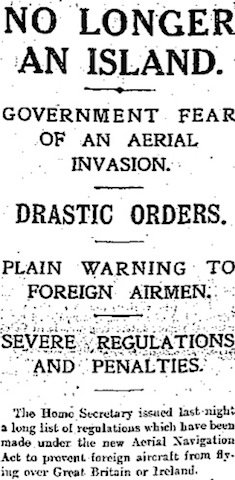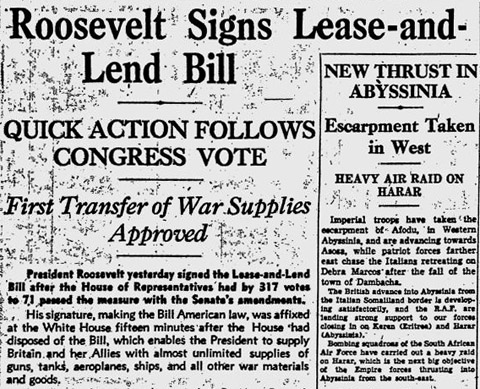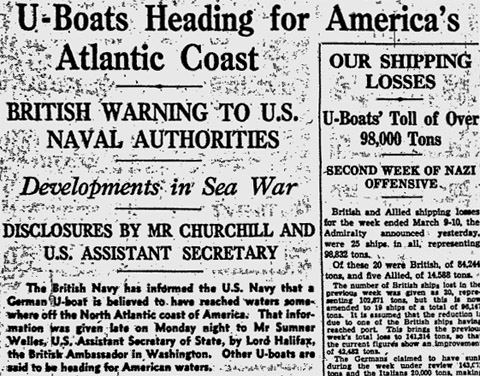
The big news today is that the government has issued, in the words of the Daily Express, ‘a long list of regulations under the new Aerial Navigation Act to prevent foreign aircraft from flying over Great Britain or Ireland’ (p. 1) The extraordinary thing is that despite their length (9 orders, 4 schedules, a notice, and 4 regulations, excluding maps) they are quoted either in full or in large part by every major newspaper, often as the leading news item. Even though some provisions do apply to British aviators, the vast majority of readers have never been near an airship or aeroplane and can have no direct interest in the application of the new law. And the government makes new regulations all the time without them being given such fulsome coverage in the press. The real reason why this is newsworthy is right there in the Express‘s headlines:
NO LONGER AN ISLAND.
GOVERNMENT FEAR OF AN AERIAL INVASION.
According to the Express, ‘the Orders were settled some weeks ago by the Committee of Imperial Defence’. It summarises the main points as follows:
A foreign aviator who intends to fly to the United Kingdom must first obtain a permit from the nearest British Consul, must give eighteen hours’ notice of his arrival to the Home Office, and report himself on arrival to the nearest authorised officer.
A large number of places are scheduled as prohibited areas, within three miles of which a foreign airman may not land.
Any foreign airman breaking the regulations is liable to six months’ imprisonment, or a fine of £200, or both.
Any foreign airman found guilty of espionage shall be liable to seven years’ penal servitude.
In what is perhaps a sign of how unused the Express is in digesting such mundane regulatory matters, it actually gets much of this wrong. For example, only airship pilots need to obtain a permit before entering Britain, and even then need to wait for 48 hours before actually doing so; aeroplane pilots don’t need permission but merely need to give 18 hours’ notice before landing, and then notify the authorities that they have landed and seek permission to continue flying inland. Moreover, foreign aviators are not merely prohibited from landing within 3 miles of the scheduled areas, but from flying over them altogether; and this applies not only to foreigners but to Britons as well. The parts about the penalties, including the specific mention of the Official Secrets Act, are accurate enough; and among the items prohibited to be carried by any aircraft coming from abroad are ‘photographic apparatus, homing or carrier pigeons, explosives, firearms, or mails’ (or ‘dutiable goods’, for that matter, so it’s not just about espionage).

These are the prohibited areas (Manchester Courier, p. 7).

Here they are again plotted on a map, from the Manchester Guardian (p. 8), along with the ‘eight air-ports, specially prescribed areas along the east and south coasts, at which alone our “territorial air” may be entered by navigators from abroad’ (p. 6). How effective will these regulations be? Colonel Massy, ‘a well-known authority on aircraft’, calls them ‘worse than useless’, and Percival Spencer, ‘the well-known aeronaut’, says they ‘might prove a “dead letter”‘, in both cases because of the lack of any ability to enforce them (Liverpool Echo, p. 5)
A number of newspapers, mainly on the right, link the new regulations to the scareships, indeed regarding them as further proof of the accuracy of the mystery airship reports. The Express again (p. 1):
The very elaborate nature of these regulations and the sharp penalties set out for an infringement of them by a foreign airman seem to prove conclusively that the Government has received authentic reports of the appearance of foreign aircraft in this country.
The Globe takes the opportunity for some score settling (p. 7):
It is somewhat curious to note that while the Radical Press continues its attempts to ridicule the statements of night visits to these shores by unknown airships, the Government, on the other hand, gives obvious indication that it is well aware of the fact that at least some of the reports are founded on a substantial basis.
This doesn’t mean it thinks much of the government’s new regulations: ‘its methods of dealing with a grave national peril are nothing short of ludicrous’. Its ‘Notes of the day’ column takes a sarcastic view of the effectiveness of the regulations (p. 1):
It is useless, for instance, for any foreigner to attempt to fly to the United Kingdom without previously filling in a form, the intricacies of which challenge pleasant comparison with those on which the panel doctors spend laborious days and night. Having filled in his form, the diligent airman is required to give notice of the Home Office of his proposed visit, and, having landed, he must report himself personally ‘to the authorised officer.’ But this is not all. A foreign airship that flies over the ‘prohibited areas’ is liable to be warned by the firing of projectiles discharging smoke or red stars or other deadly things ‘that go bump in the night.’ Whereupon the airship shall land incontinently, or if that be inconvenient, shall wave white lights or make such other frantic signals as will convince our watchful guardians that it has been duly frightened. What happens if any or all of these drastic regulations are ignored by the airship we do not know. If there is any sort of a gun handy, possibly it will be shot at and severely hurt. Possibly not. Anyway it is all very magnificent, even if it is not war.
The Manchester Courier, possibly the most self-regarding newspaper in the whole country, considers the regulations a victory for its own scaremongering (p. 7):
Never has a newspaper campaign in the interests of the country been so completely justified as that with which ‘The Manchester Courier’ has been so prominently identified of late. Within a fortnight the whole attitude of the country towards aerial navigation has been completely changed. The drastic regulations issued by the Home Secretary are a naturally [sic] corollary of the visit of German airships to this country. We may now hope for a definite announcement, when Parliament meets to-morrow, of the provision of an Aerial Budget to meet the pressing needs of the country.
The Devon and Exeter Gazetter is not so optimistic, however, that the government even now understands the need for ‘an adequate system of aerial defence’ (p. 2), and darkly hints at a conspiracy between the government and the liberal press to ridicule the issue:
Our contemporary [the News Chronicle], after at first sending its special correspondents hither and thither in search of evidence in favour of the opinion that the strange skycraft were something more formidable than figments, has changed its note, and endeavours to persuade its readers that the disquieting appearances, for which so many witnesses vouched, were explicable by the brightness of the planet Venus — or to a kind of ‘hypnotic self-suggestion,’ and closed a series of sceptical accounts from towns whence airships had been reported with the ‘crushing’ comment that ‘at Ipswich the police have observed nothing.’ There is such suspicious unanimity among the leading journals of the Ministerial Party, that we must be forgiven if we suggest that the attitude they have adopted on this question, and which has necessitated ‘The Daily Chronicle’ performing a somersault, is dictated from a Government Department.
The Navy, at least, still seems to be taking phantom airships seriously. The Dundee Evening Telegraph reports that ‘the Admiralty have taken immediate steps to obtain full and first-hand information’ of the airship seen by the officers and crew of the City of Leeds off Grimsby (p. 1):
A representative proceeded to the port and had a long interview with the captain and his second officer Williams, who had the ship under observation in clear moonlight. The Admiralty representative has taken detailed statements from them for consideration and further investigation.
The significance of the Humber for Britain’s defence, especially ‘the existence of one of the most powerful and closely-guarded wireless stations near Grimsby’, is said to add ‘to the significance of the reported airship visits’.
But the City of Leeds airship sighting could be eclipsed by another, much more spectacular incident in the North Sea, in which an airship shone its searchlight onto the steam trawler Othello and nearly collided with it. The report was made last night by Othello‘s captain, H. Parker, upon arrival at Hull. Many papers carry this story today (including the Daily Express, the Dundee Evening Telegraph, the Globe, the Freeman’s Journal, the Irish Times, the Liverpool Echo, the Manchester Courier, the Manchester Guardian, and the Standard), but this is how the Dundee Courier reports it (p. 5):
The skipper stated that about 8.15 on Friday last [28 February 1913], when he was 170 miles north-east of the Spurn, an airship with a powerful searchlight hovered over his vessel.
He and the chief engineer were on the bridge at the time. There was neither moon nor stars. The first thing he observed was a light in the distance. In five minutes the light was practically above the trawler, and the powerful searchlight was cast on the boat.
The aircraft sailed so low that they thought the craft would touch the trawler’s masts.
The skipper blew the syren, and the airship swerved to the west, circled the trawler twice, and afterwards rose in the air and disappeared in a westerly direction.
During her manœuvres two other brilliant lights were noticed.
The skipper’s story is confirmed by members of the crew, who confess that they were somewhat alarmed by the appearance of the airship, of whose nationality they had no idea.
Perhaps the most remarkable mystery airship sighting so far.
![]() This work is licensed under a Creative Commons Attribution-NonCommercial-NoDerivatives 4.0 International License.
Permissions beyond the scope of this license may be available at http://airminded.org/copyright/.
This work is licensed under a Creative Commons Attribution-NonCommercial-NoDerivatives 4.0 International License.
Permissions beyond the scope of this license may be available at http://airminded.org/copyright/.





Pingback: Thursday, 6 March 1913
Pingback: Friday, 7 March 1913
Pingback: Friday, 21 March 1913
Pingback: Saturday, 8 March 1913 | Airminded
Pingback: The foe in the night | Airminded